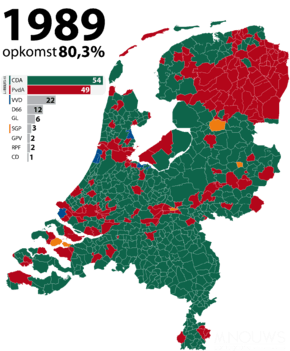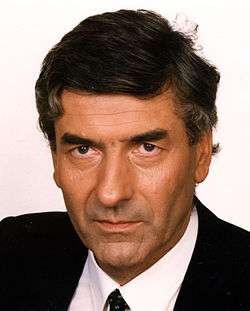1989 Dutch general election
General elections were held in the Netherlands on 6 September 1989.[1] The Christian Democratic Appeal (CDA) remained the largest party, winning 54 of the 150 seats in the House of Representatives.[2] This chamber served for 4 years and 7 months, the longest tenure of any modern Dutch parliament.
| |||||||||||||||||||||||||||||||||||||||||||||||||||
All 150 seats in the House of Representatives 76 seats needed for a majority | |||||||||||||||||||||||||||||||||||||||||||||||||||
|---|---|---|---|---|---|---|---|---|---|---|---|---|---|---|---|---|---|---|---|---|---|---|---|---|---|---|---|---|---|---|---|---|---|---|---|---|---|---|---|---|---|---|---|---|---|---|---|---|---|---|---|
| Turnout | 80.3% | ||||||||||||||||||||||||||||||||||||||||||||||||||
This lists parties that won seats. See the complete results below. | |||||||||||||||||||||||||||||||||||||||||||||||||||
 | |||||||||||||||||||||||||||||||||||||||||||||||||||
| |||||||||||||||||||||||||||||||||||||||||||||||||||
Following the elections, the CDA formed a coalition government with the Labour Party with the CDA's Ruud Lubbers continuing as Prime Minister.
Results
| Party | Votes | % | Seats | +/– |
|---|---|---|---|---|
| Christian Democratic Appeal | 3,140,502 | 35.3 | 54 | 0 |
| Labour Party | 2,835,251 | 31.9 | 49 | –3 |
| People's Party for Freedom and Democracy | 1,295,402 | 14.6 | 22 | –5 |
| Democrats 66 | 701,934 | 7,9 | 12 | +3 |
| GreenLeft | 362,304 | 4.1 | 6 | +3 |
| Reformed Political Party | 166,082 | 1.9 | 3 | 0 |
| Reformed Political League | 109,637 | 1.2 | 2 | +1 |
| Reformatory Political Federation | 85,231 | 1.0 | 1 | 0 |
| Centre Democrats | 81,427 | 0.9 | 1 | +1 |
| Anti Unemployment Party | 115,532 | 1.3 | 0 | New |
| Elderly Central | 0 | New | ||
| The Greens | 0 | New | ||
| Great Alliance Party | 0 | New | ||
| Humanist Party | 0 | 0 | ||
| Environmental Defence Party 2000+ | 0 | New | ||
| Party of Democratic Socialists | 0 | New | ||
| Political Party for the Elderly | 0 | New | ||
| Realistic Netherlands | 0 | New | ||
| Socialist Workers' Party | 0 | 0 | ||
| Constitutional Federation | 0 | New | ||
| Socialist Minority Party | 0 | New | ||
| Socialist Party | 0 | 0 | ||
| League of Communists in the Netherlands | 0 | 0 | ||
| Progressive Minorities Party | 0 | New | ||
| Women's Party | 0 | New | ||
| Invalid/blank votes | 26,485 | – | – | – |
| Total | 8,919,787 | 100 | 150 | 0 |
| Registered voters/turnout | 11,112,189 | 80.3 | – | – |
| Source: Nohlen & Stöver | ||||
gollark: Idea: utilization of apiobees.
gollark: I just do not like its use of `char` and am happy that other languages get it right.
gollark: Oh dear this is somewhat bees, *how* do I go around stopping a service?
gollark: This is an example of C bad, although not one they can change.
gollark: Stuff should be Unicode by default, and not just *assume* ASCII.
References
- Dieter Nohlen & Philip Stöver (2010) Elections in Europe: A data handbook, p1396 ISBN 978-3-8329-5609-7
- Nohlen & Stöver, p1414
This article is issued from Wikipedia. The text is licensed under Creative Commons - Attribution - Sharealike. Additional terms may apply for the media files.
